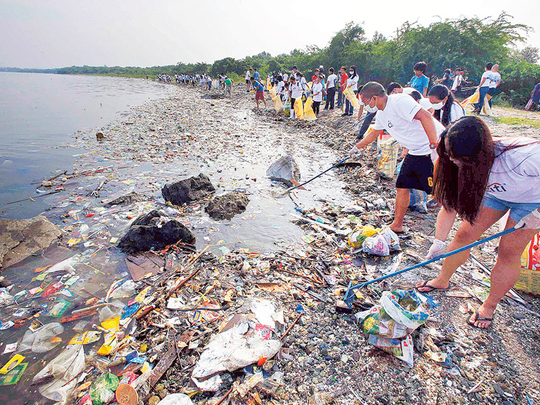
Manila: Despite its relatively average land mass, the Philippines is in the big leagues when it comes to its contribution to ocean pollution, a study said.
The EcoWaste Coalition, citing a study published by the journal Science, said the Philippines ranks third among countries, after China and Indonesia, that dump plastic waste in the world’s oceans.
“The recent study on plastic wastes generated by coastal countries and entering the oceans should serve as a wake-up call to the Philippine government, the industry, and the public in general,” EcoWaste, which advocates for zero waste and is against the use of plastic bags, said.
According to the study Plastic Waste Inputs From Land Into The Ocean authors, “Population size and the quality of waste management systems largely determine which countries contribute the greatest mass of un-captured waste available to become plastic marine debris.”
Aileen Lucero, national coordinator of the EcoWaste Coalition, said the study affirmed what their group had been asserting for years.
“Almost fifteen years of poor implementation of the Ecological Solid Waste Management Act (RA 9003) and unheeded calls for national ban on the undoubtedly problematic and persistent plastic bags apparently helped a lot in putting the country at the third place in the study’s embarrassing list,” she added.
In 2014, during the follow up to their 2006 and 2010 waste audits of the Manila Bay, the EcoWaste Coalition and three other groups still found that plastics topped the list of the bay’s marine debris at 61.9 per cent; of this, 23.2 per cent are plastic bags.
The same group’s waste audits in 2006 and 2010 yielded similar results: among plastic products, plastic bags were the main garbage contributor in terms of volume, comprising 51.4 and 27.7 per cent, respectively, of the debris in Manila Bay.
The Plastic Waste Inputs From Land Into The Ocean study has calculated that plastic debris reaching the oceans from 192 coastal countries in 2010 was somewhere between 4.8 and 12.7 million metric tonnes. According to Dr Jenna Jambeck of the University of Georgia, the study’s lead author, a more visual comparison is that for every foot of coastline in the world, the quantity of plastics entering the ocean is equal to about five full plastic grocery bags.
The study also suggests that at the rate of 17.5 million tonnes a year, 155 million tonnes could be entering the oceans by 2025 if nothing is done to check the situation.












